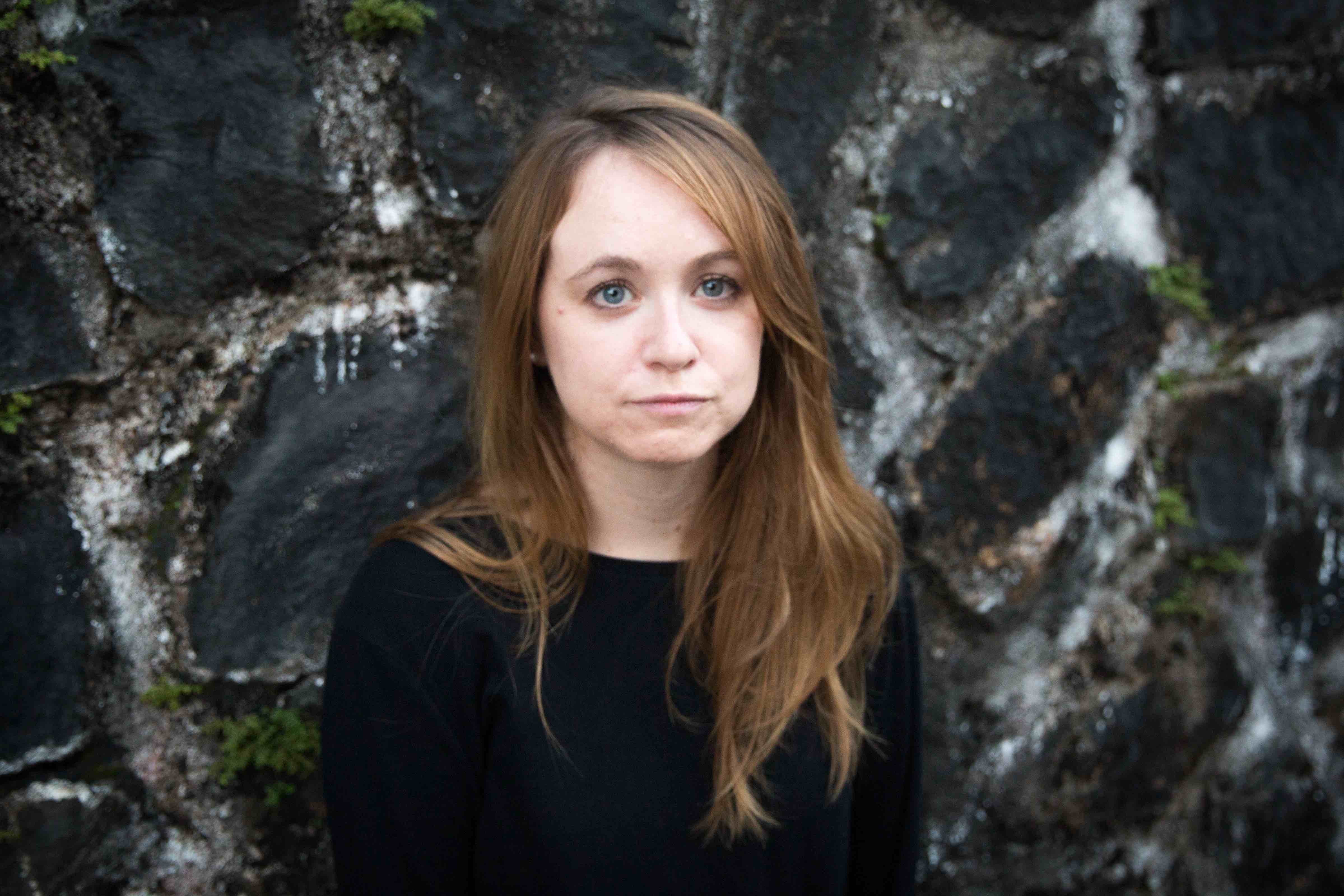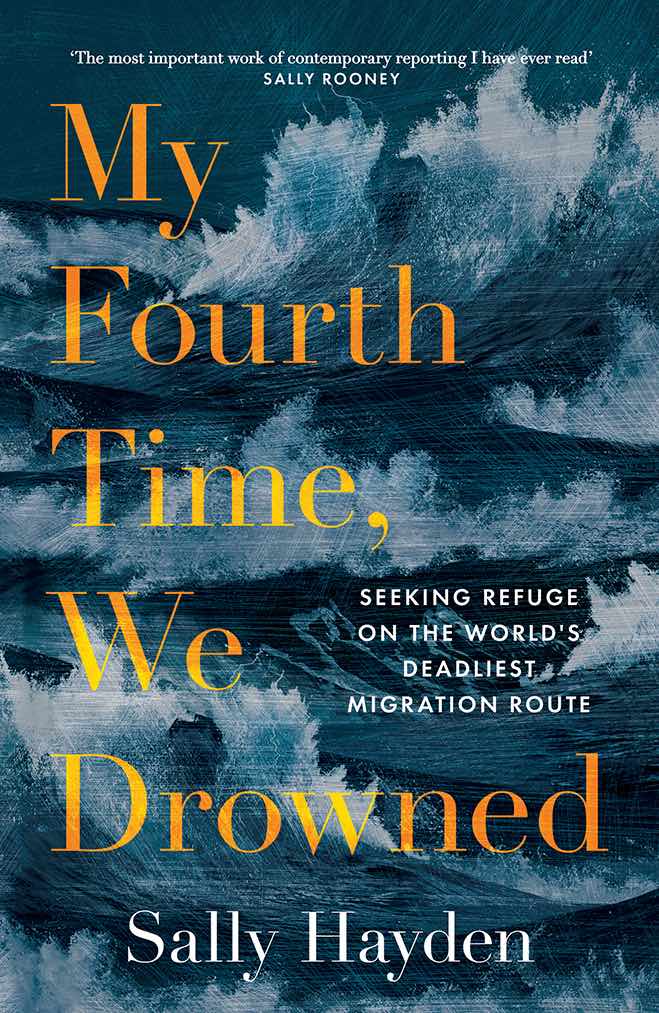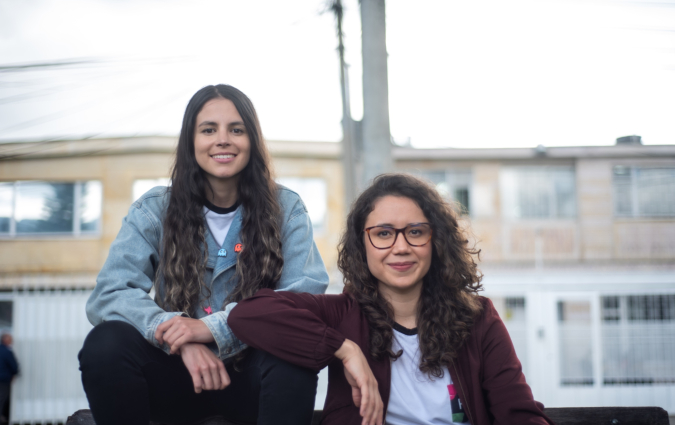"A more humane policy is possible": Sally Hayden on the welcome to Ukrainians and on covering refugees before Putin's war

Sally Hayden. | Credit: Rachel Meagher
Sally Hayden is a freelance journalist focused on migration and humanitarian issues. She’s reported from Europe, Africa and the Middle East, and has published her work in numerous outlets, including Reuters, Foreign Policy and the Guardian. Sally also volunteered as a mentor for The Refugee Journalism Project. Her first book My Fourth Time, We Drowned has just been published in the UK.
As Europe welcomes millions of Ukrainian refugees escaping from a war zone, I spoke with Sally about her book and about her experience covering migration issues. She offered advice for journalists who want to follow in her footsteps and outlined how European policy has affected those fleeing violence in Africa. Our conversation has been edited for length and clarity.
Q. The title of your book comes from a quote by a Somali refugee: “I was caught by the Libyan coastguard three times (...). And my fourth time, we drowned. And the fifth time, I made it to safety.” Why did you choose this title?
A. I wanted to have a title that was coming from somebody who was experiencing this journey. That [quote] shows that people are being forced back to what is effectively imprisonment, indefinite detention. So they have to try again and again and again and again, to reach safety.
The other important thing is that this guy says, “My fourth time we drowned.” In the West we are often more individualistic. People making these journeys are supporting each other along the way, so there's more charity among those people than we might imagine. There's also the sense that you might start the journey as an individual but on the way you become cargo or a detainee and your whole history is wiped from you. That’s horrific. Even though they survive, some people I've interviewed feel like they were among the dead because others didn't survive it. They don't understand why they may have escaped that. That guy did make it to Europe. But he's still suffering a loss.

Q. Your book begins with you being contacted out of the blue by refugees in Libya. Can you share what you were reporting on before and how they found you?
A. My understanding is that they came across my name because one of the guys who was in their detention centre's brother was in Sudan and I had been to Sudan the previous year. I interviewed a lot of Eritrean and Ethiopian refugees in Sudan, and I ended up publishing an investigation into UNHCR in Sudan, with detailed allegations that their staff were involved in a corruption scandal. They were alleged to be taking tens of thousands of dollars from refugees to resettle them to a safe country.
What's called the “legal route” is the very unlikely chance that you will be chosen for legal resettlement to Europe or North America. According to the refugees I talked with, what was happening in Sudan was this: if you wanted to take the safe route, you had to pay huge amounts of money. And so it wasn't the most vulnerable people that were being chosen, as the UN said.
I published that investigation in May 2018. Two days later, UNHCR suspended their refugee resettlement programme pending the investigation. About a year later, they did found one staff member guilty. Because of this investigation, my reporting was quite well known in Sudan. That’s how they told me they heard my name.
I hadn't been reporting on Libya. I knew it was very difficult to go there. And when they contacted me, war had broken out around them. There were 500 men, women and children, and they had been abandoned in the middle of this conflict. It was very shocking.
Q. How did the internet and social media affect your work as a journalist?
A. The internet has revolutionised journalism. There were so many areas that were very difficult to access before the internet… Now it is easier to get information out of these places but you need to verify that information.
A lot of this reporting is based on messages from people within detention centres. And one of the things that I realised early on is that when you're in contact with someone in a detention centre, it can be really hard to verify their personal story. They might tell you a lot about their history. And of course, you listen and you talk to them about it. But that's much more difficult for you to verify until you do things like start meeting their relatives, which I've done with a lot of my sources now.
One of the easiest things was verifying incidents. If someone contacted me from a detention centre and said, ‘This thing happened today,’ I'd have multiple other contacts in that detention centre. They might be from other countries. They might not speak to each other. Then I'd also have sources within agencies, even Libyan sources. And so I could also contact them and say, “Did this incident happen?” That's the way that you piece the story together.
One thing that I'd say to people who are doing refugee reporting is this: make yourself easily contactable. I've always been easy to contact, and that's one of the reasons why I guess I get contacted, particularly by the refugees themselves.
Q. Did you find there was still a line between reporting as an observer and getting involved? Or was that line blurred, even just emotionally, after talking to refugees over a long period of time?
A. It depends what you call getting involved. I spent a lot of time passing information around. So a lot of what I was sent, I didn't publish. I would be the one passing it to different NGOs or to the UN or to human rights groups or just to anyone who maybe could help.
As a journalist, I didn't really realise that's something that you would end up doing. I had NGOs, and also UN sources contacting me as well. They would ask: “What's the situation here? What's going on here? Did you hear about this?” So I reported probably less than I would have liked to. But that’s because I passed on the information and sought improvements before making it public. Making something public tended to be the last resort, and that was obviously done with the request and the consent of the sources.
Q. How did you keep your sources safe when they were already in such a precarious situation?
A. They weren't safe at all at any point. So then I guess the question is what level of risk is acceptable. There can be a paternalistic thing where you say, “No, we won't publish anything at all in case it makes things worse.” And actually I tend to regard refugees who are in a situation as the best ones to make that judgement. As a journalist, you have to explain that what you publish will be on the internet. There were a lot of discussions around anonymity. Exactly, how much information do I give? Do I say your nationality? Do I use this quote? Or is this too specific?
And at the same stage, I do also feel that they're the best ones to make those decisions because I don't think it's fair to say they don't know the risk or they don't know the consequences. Of course, they know the risk because they had been living in Libya for years at that point. And it could happen that if I published a story, the Libyan guards might come in and search everybody for phones afterwards. That happened a few times: people were asked if they had been in contact with me. At the same time, by publishing nothing if somebody is begging you to, are you not doing a disservice to them?
Q. What challenges did you face during your reporting on refugees?
A. I faced threats to my own security and a criminal investigation which went on for about a year. Both things had a slight chilling effect. I was scared. I wasn't certain about my safety. I was tipped off at one point that there were attempts to discredit me. As a freelancer, you can end up feeling quite alone in those situations. If it happens to you, you should know that you are not alone in experiencing that.
Q. Would have been more protected if you had been a staff reporter?
A. If I had been a staff reporter, I wouldn't have been doing this reporting because I wouldn't have been able to find an organisation that would support me to report on one issue for four years. It's rare that you get to do such in-depth reporting on one issue if you have a staff position. That was one of the reasons why I stayed freelance throughout this time.
A lot of this type of reporting is being done by freelance journalists, particularly on issues around refugees. At the same time, that leaves those people quite exposed and vulnerable, in terms of the pressure they can be put under. So I don't know what's the right answer. I'm just saying it's something to be aware of.
Q. During your reporting, especially when you were travelling, did you feel you were treated differently because you came from Europe?
A. Of course. And that's something that I discuss in the book: that racism is underpinning everything I've reported. At the same time, a few people have asked me, ‘Should you be the person reporting this?’ And my answer is that this is a story as much about Europe as it is about Africa. It's a story about white people, and European governments. It’s a story about privilege as much as it is about desperation or not having the right passport or making a dangerous journey.
As a European, I do think you have certain access. If I count up the amount of countries that I went to for the book and compare it with the fact that people who I was in touch with in 2018 are still in Libya right now, in and out of detention centres, that's incredibly uncomfortable.
Q. Almost four million Ukrainians have already fled their country. Many observers suggest there’s a big difference in the way both European governments and European citizens are treating them and the way they treated non-white refugees. Do you agree with this view?
A. The way that Ukrainian refugees have been treated has been quite shocking for those of us who've reported on Europe's borders until now. I think it's good and something that’s given journalists some semblance of hope because they're thinking, ‘Well, actually, a more humane policy is possible.’
At the same time, it is quite astounding, because [over] three million have now crossed. In the entire year of 2015, when we had the so-called migrant crisis, you had 1.3 million who claimed asylum across the EU. That had huge repercussions across the entire continent. There was a lot of backlash. That's the reason why we're seeing these types of controls in the Central Mediterranean, for example.
And yet you need to be careful about comparing the numbers of people who do cross the EU border. Ukrainian men can't leave, but the borders are open for the rest. So the numbers have gone so high because of that. That's not to say that the numbers on the other borders wouldn’t be higher. We have these extreme controls that are really just destroying lives and stopping people from reaching safety.
In the media coverage [of this crisis], we’ve heard things like, “These are civilised people, these are educated people coming out of Ukraine.” That seems to be a way of saying, “These are white people.”
However, nobody would say that [Europe welcoming Ukrainian refugees] is a bad thing. It's been great. It's been kind of inspiring in a lot of ways. At the same time, I think it's been quite hurtful for not just journalists reporting on this but also for a lot of refugees that I'm in touch with. They’ve been quite upset at the welcome for Ukrainians while thinking about what their families faced or about their loved ones who died on the route.
Q. How can reporters stick with refugee stories longer-term, after the initial attention dies out?
A. 2015 is when I really started reporting on migration. I went to Calais in northern France. In August 2015 David Cameron said something about there being “swarms of migrants” in Calais. I had a staff job at the time and my editor agreed to let me go. When I started on my job, they had given me hundreds of business cards. So I just brought a lot of business cards with me and I started handing them out to pretty much everyone I met. I just said, “Stay in touch, let me know if you reach the UK or if you have updates that you want to share.”
Obviously, many people never contacted me again. But some people did, and I started gathering sources from that point. I just say to people, “I'm a journalist, I can't help you. But if there's something you think needs to be reported, let me know. I'll look into it.”
And I think that's a way of getting stories and finding out what's actually important. You need to be connected with the communities that are experiencing these things. They need to be able to tell you what’s important to them. It's not just you deciding the kind of story that you want to do. The thing that is suggested to you might be very different to what you imagine.
Q. Can you give me an example?
A. One of the people that I met when I went on that trip to Calais was Ziad Ghandour, who was a Syrian English literature graduate who was trying to reach the UK. I gave him my card and he contacted me about a month later. He said he was in the UK, and we stayed in touch. He had met so many journalists on the way through Europe that he decided he wanted to become a journalist too. So I helped him with a few contacts. And then we ended up doing a story together in 2017, which looked at Syrians who were trying to go back to their country.
This was something that he told me was happening. I actually had no idea about it. You hear this narrative that everybody just wants to reach Europe and actually there was this big trend of Syrians trying to return to the regime-held part of Syria. However, a lot of them were just disappearing when they arrived. It wasn't clear what was happening to them.
So we went around and interviewed people about this. We spent a lot of time looking at a Facebook group where people tried to exchange information about how to make these journeys. I could go to Syria. He obviously couldn't because it was too dangerous. But I went to Syria, and I ended up meeting one man who had returned, who said he had been arrested at the airport, locked up, tortured, and then sent off to the frontlines to fight against ISIS, where he narrowly survived a suicide bombing. That was a story I would never have got without Ziad. We were speaking pretty regularly and he was also becoming a journalist, which meant that we could partner and do a lot more in-depth reporting than I would have been able to.
[The lesson is:] stay in touch with people. Ask them what they think is important. See whom you can get involved. I'm sure there's lots of Ukrainian journalists who are being forced to flee right now as well. You can involve them as well as reporters. That's going to give your reporting a lot more depth.
In every email we send you'll find original reporting, evidence-based insights, online seminars and readings curated from 100s of sources - all in 5 minutes.
- Twice a week
- More than 20,000 people receive it
- Unsubscribe any time







